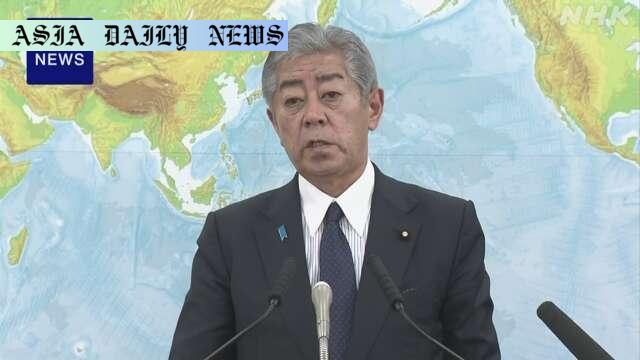Israel-Iran conflict: Japanese Foreign Minister Iwaya Takeshi stresses dialogue, urges de-escalation and citizen safety.
Japanese FM Iwaya Takeshi emphasizes dialogue to calm tensions.
Iwaya condemns nuclear development by Iran as unacceptable.
Japan seeks to ensure the safety of 1,000 Japanese citizens in Israel.
Israel agrees to maintain close communication with Japan.

Japan Calls for Dialogue to Address Israel-Iran Conflict
In a recent telephone discussion, Japanese Foreign Minister Iwaya Takeshi called for restraint and dialogue to address the escalating conflict between Israel and Iran. Speaking with Israeli Foreign Minister Gideon Saar, Iwaya expressed Japan’s deep concern over the ongoing violent exchanges and the significant destruction they have caused. The call, which lasted approximately 25 minutes, comes one week after the outbreak of armed clashes that have raised alarms internationally. emphasizing the importance of a peaceful resolution, Iwaya highlighted that further escalation would only deepen the crisis and put countless lives at risk.
With Iran’s nuclear activities drawing widespread criticism, Iwaya reiterated Japan’s strong stance against nuclear proliferation. He stressed that while dialogues remain challenging amidst the current tension, they are the most effective means to de-escalate and achieve stability. He underscored that Iran’s development of nuclear weapons poses a grave threat not only to the region but also to global peace, urging the international community to act responsibly in mitigating risks.
Ensuring the Safety of Japanese Nationals in Israel
During their conversation, Minister Iwaya also raised concerns for the safety of approximately 1,000 Japanese citizens residing in or visiting Israel. He requested Israel’s cooperation in safeguarding their welfare during this volatile period. Minister Saar assured Japan of full cooperation, marking a positive step toward protecting non-combatants caught in the turmoil. Japan’s proactive approach reflects its broader commitment to global peace and citizen safety in conflict regions.
The two leaders agreed on the importance of maintaining open lines of communication to manage the evolving situation effectively. Despite the geographical distance, Japan’s engagement in this issue highlights its broader interest in promoting peace and stability in volatile regions, aligning with its foreign policy objectives.
Challenges and the Potential Path Forward
The escalating conflict between Israel and Iran underscores the complexities of ensuring peace in a region fraught with historical and political tensions. While Japan’s call for dialogue and de-escalation is valuable, actualizing this agenda amidst mutual distrust and deeply rooted hostilities remains a formidable challenge. The stakes are higher with the involvement of nuclear development, which adds a layer of urgency to the conflict resolution efforts.
Japan’s advocacy for peaceful negotiations aligns with its pacifist constitution and its commitment to global peace initiatives. The conversations between Takeshi and Saar further reflect Japan’s proactive stance, even in regions considered beyond its immediate geopolitical influence. By amplifying dialogue and respecting the sovereignty of the nations involved, Japan underscores its role as a responsible global actor.
In conclusion, while Japan’s diplomatic intervention cannot directly shape the policies of the involved states, it sends a strong signal about the importance of proactive diplomacy in addressing international crises. Collaboration and dialogue will remain critical in revisiting shared goals for peace, sustainability, and mutual respect within the afflicted region.
Commentary
Japan’s Role in Promoting Peace Amid the Israel-Iran Conflict
Japan’s recent initiative to mediate peace in the escalating Israel-Iran conflict is both commendable and reflective of its growing commitment to global stability. By prioritizing dialogue over aggression, Japanese Foreign Minister Iwaya Takeshi has showcased Japan’s willingness to engage meaningfully with critical global issues despite being geographically distant from the conflict’s epicenter. This move resonates strongly with Japan’s constitutional values and its broader context as a nation dedicated to peaceful conflict resolution.
The Importance of Avoiding Escalation
It cannot be overstated how critical it is for nations such as Japan to call for de-escalation when tensions rise in volatile regions. The Israel-Iran conflict carries severe risks of spiraling into an uncontrollable crisis that endangers millions of lives. With nuclear implications hovering in the background, the stakes of ensuring peace have never been higher. Iwaya’s measured tone and appeal for dialogue underscore the broader international consensus that more military aggression will only diminish future prospects of stability.
Citizen Safety as an Element of Diplomacy
Another valuable aspect of Japan’s approach is its focus on protecting its citizens abroad. With over 1,000 Japanese nationals stranded in a region rocked by violence, Iwaya’s plea for Israel’s cooperation puts a human face to the politics. This gesture demonstrates Japan’s ability to marry its domestic responsibilities with its foreign policy priorities, ensuring that public welfare is not compromised even during distant international crises.
Overall, Japan’s stance in urging restraint and dialogue serves as an invaluable reminder of the importance of diplomacy and responsibility in international relations. It highlights the potential for collective efforts from nations around the globe to bring about peaceful solutions even under the most contentious circumstances.


